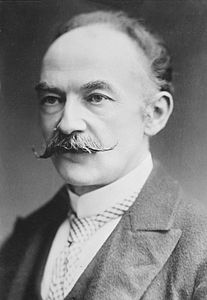Analysis of De Profundis
Thomas Hardy 1840 (Stinsford) – 1928 (Dorchester, Dorset)
"Percussus sum sicut foenum, et aruit cor meum."
- Ps. ci
Wintertime nighs;
But my bereavement-pain
It cannot bring again:
Twice no one dies.
Flower-petals flee;
But, since it once hath been,
No more that severing scene
Can harrow me.
Birds faint in dread:
I shall not lose old strength
In the lone frost's black length:
Strength long since fled!
Leaves freeze to dun;
But friends can not turn cold
This season as of old
For him with none.
Tempests may scath;
But love can not make smart
Again this year his heart
Who no heart hath.
Black is night's cope;
But death will not appal
One who, past doubtings all,
Waits in unhope.
De Profundis
"Considerabam ad dexteram, et videbam; et non erat qui cognosceret me
When the clouds' swoln bosoms echo back the shouts of the many and
strong
That things are all as they best may be, save a few to be right ere
long,
And my eyes have not the vision in them to discern what to these is
so clear,
The blot seems straightway in me alone; one better he were not here.
The stout upstanders say, All's well with us: ruers have nought to
rue!
And what the potent say so oft, can it fail to be somewhat true?
Breezily go they, breezily come; their dust smokes around their
career,
Till I think I am one horn out of due time, who has no calling here.
Their dawns bring lusty joys, it seems; their eves exultance sweet;
Our times are blessed times, they cry: Life shapes it as is most
meet,
And nothing is much the matter; there are many smiles to a tear;
Then what is the matter is I, I say. Why should such an one be here?
Let him to whose ears the low-voiced Best seems stilled by the clash
of the First,
Who holds that if way to the Better there be, it exacts a full look
at the Worst,
Who feels that delight is a delicate growth cramped by crookedness,
custom, and fear,
Get him up and be gone as one shaped awry; he disturbs the order
here.
De Profundis
"Heu mihi, quia incolatus meus prolongatus est! Habitavi cum
habitantibus Cedar; multum incola fuit aninia mea."--Ps. cxix.
There have been times when I well might have passed and the ending
have come -
Points in my path when the dark might have stolen on me, artless,
unrueing -
Ere I had learnt that the world was a welter of futile doing:
Such had been times when I well might have passed, and the ending
have come!
Say, on the noon when the half-sunny hours told that April was nigh,
And I upgathered and cast forth the snow from the crocus-border,
Fashioned and furbished the soil into a summer-seeming order,
Glowing in gladsome faith that I quickened the year thereby.
Or on that loneliest of eves when afar and benighted we stood,
She who upheld me and I, in the midmost of Egdon together,
Confident I in her watching and ward through the blackening heather,
Deeming her matchless in might and with measureless scope endued.
Or on that winter-wild night when, reclined by the chimney-nook
quoin,
Slowly a drowse overgat me, the smallest and feeblest of folk there,
Weak from my baptism of pain; when at times and anon I awoke there -
Heard of a world wheeling on, with no listing or longing to join.
Even then! while unweeting that vision could vex or that knowledge
could numb,
That sweets to the mouth in the belly are bitter, and tart, and
untoward,
Then, on some dim-coloured scene should my briefly raised curtain
have lowered,
Then might the Voice that is law have said "Cease!" and the ending
have come.
| Scheme | ab bcxb dxxa effe ghhg fiix jdxjB a klmlbno pppmno qxqmo xrsrbntoB ab uAbluuA vttv xttx scmmx xakxgxuA |
|---|---|
| Poetic Form | Tetractys (29%) |
| Metre | 11111111 11 101 110101 110101 1111 10101 111111 1111001 1101 1101 111111 001111 1111 1111 111111 110111 1111 111 111111 011111 1111 1111 11111 11111 101 11 11111111111 101111010110100 1 1111111111011111 1 01111010011011111 11 011101011101011 011111111111 1 0101011111111111 11111111011 01 11111111111111101 111101111111 10111111111111 1 0101101011101101 11101011111111111 11111011111101 101 11111101011101011 101 1110110100111100 1001 11101111101101010 1 11 1111110111 1101111111 11111111110010 11 10111011110111 1 1111101101011010 11111111110010 11 11011011010111011 01101101101010 1001001010101010 1001111100111 111111101001011 110110100111010 10010010011010010 10101011101 111101110110101 1 10011101001111 11110011111011011 1101101111011011 10111110111110 11 111010010110010 001 11111011110110 110 11011111110010 11 |
| Closest metre | Iambic pentameter |
| Characters | 3,462 |
| Words | 638 |
| Sentences | 27 |
| Stanzas | 18 |
| Stanza Lengths | 2, 4, 4, 4, 4, 4, 5, 1, 7, 6, 5, 9, 2, 7, 4, 4, 5, 8 |
| Lines Amount | 85 |
| Letters per line (avg) | 31 |
| Words per line (avg) | 7 |
| Letters per stanza (avg) | 148 |
| Words per stanza (avg) | 35 |
Font size:
Submitted on May 13, 2011
Modified on April 09, 2023
- 3:11 min read
- 174 Views
Citation
Use the citation below to add this poem analysis to your bibliography:
Style:MLAChicagoAPA
"De Profundis" Poetry.com. STANDS4 LLC, 2024. Web. 26 Apr. 2024. <https://www.poetry.com/poem-analysis/36353/de-profundis>.


Discuss this Thomas Hardy poem analysis with the community:
Report Comment
We're doing our best to make sure our content is useful, accurate and safe.
If by any chance you spot an inappropriate comment while navigating through our website please use this form to let us know, and we'll take care of it shortly.
Attachment
You need to be logged in to favorite.
Log In